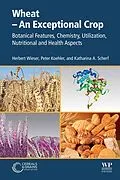Wheat - An Exceptional Crop: Botanical Features, Chemistry, Utilization, Nutritional and Health Aspects presents the exceptional position of wheat among food crops. The book demonstrates the benefits and drawbacks of wheat from a wheat science, nutrition and technology perspective. Organized into 13 chapters, chapters 1 - 3 present a basic overview of wheat; chapters 4 - 6 explore the overall benefits of wheat for the general population, and chapters 7 - 13 assess wheat-related disorders that affect a small portion of the population. Wheat - An Exceptional Crop: Botanical Features, Chemistry, Utilization, Nutritional and Health Aspects is an exceptional reference for those working in and researching the fields of agronomy, food chemistry, food technology, nutrition, allergology and gastroenterology. - Explores the botanical features of wheat, chemical composition of wheat grains, and the cultivation and milling of wheat - Highlights wheat-based food and feed, wheat-based raw materials, and the nutritional value of wheat - Discusses principles of wheat hypersensitivities and various wheat-related disorders
Autorentext
Herbert Wieser obtained a Ph.D. degree in food chemistry in 1974 from the Technical University of Munich. In 1973, he joined the German Research Center for Food Chemistry and was member, head and scientific advisor of the working group "structure/function relationships of biopolymers until his retirement in 2017. He published 330 original scientific papers and book contributions. He was awarded the Max-Rubner Award of the German Nutrition Society in 1984, the Osborne Medal of the AACC International in 2007, and the Neumann Medal of the German Association of Cereal Research in 2009.
Inhalt
1. Botanical Features of Wheat 2. Chemical Composition of Wheat Grains 3. Cultivation and Milling of Wheat 4. Wheat-Based Food and Feed 5. Wheat-Based Raw Materials 6. Nutritional Value of Wheat 7. Principles of Wheat Hypersensitivities 8. Celiac Disease 9. Wheat Allergy 10. Non-Celiac Gluten Sensitivity 11. Irritable Bowel Syndrome 12. Treatment of Dietary Wheat Hypersensitivities 13. Future Research on Wheat Hypersensitivities
